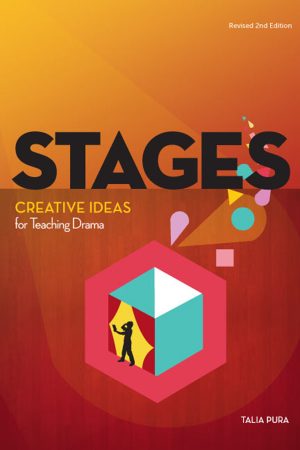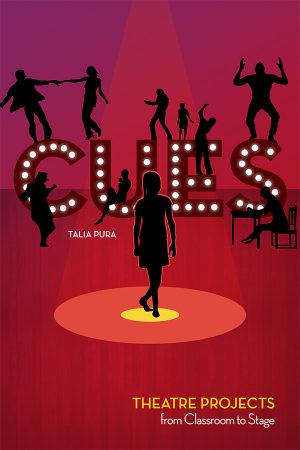Posted August 8, 2024
The Interview – Talia Pura
Talia Pura
Talia Pura is a filmmaker, playwright, actor, dancer and educator whose books include STAGES: Creative Ideas for Teaching Drama, and CUES: Theatre Training & Projects from Classroom to Stage. Pura created ten short films and several plays, taught drama at the University of Winnipeg and coordinated programs for the Arts and Cultural Industries Association of Manitoba. She conducts drama workshops internationally, and has been to South Africa, the Philippines, and Brazil. Talia lives in Santa Fe, New Mexico.
Talia, you have a fascinating and eclectic career! Can you tell us a little bit about the various “hats” you wear?
Some of the hats I wear have very deep roots, and others I tried on and found that they fit later in life. I started designing and sewing my own clothes at the age of thirteen, so creating costumes for the stage and films came very naturally. I was always a dancer, but aerial silks didn’t exist until I was middle-aged. They have offered me some amazing performance opportunities and I never plan to stop climbing. In terms of theatre and film, I started out as an actor. Creating my own projects and educating others flowed from there. My playwriting career began while teaching high school drama. I couldn’t find the scripts I needed, so I wrote them, beginning with a stage adaptation of Dracula with twenty-two speaking roles. Directing also began while teaching. I love everything that I do and feel so privileged that I can wear all of my hats at different times for various projects.
JGS publishes two of your excellent books on teaching theatre, Stages and Cues, both of which offer tips and drama exercises for educators and theatre professionals alike. Why did you decide to write these books?
These books came out of a desire to give my pre-service teachers, the students I taught at the University of Winnipeg, something tangible to take into the classroom. Students in my second year of teaching asked for it. I was thrilled that Gordon agreed to publish it. It was a way of giving all teachers just what they needed, all in one place.
How do Stages and Cues differ from one another?
The first one, Stages, I see as a recipe book, something to open and immediately find something with which to engage a class of students, even if none of them have drama experience. It’s all the tools that beginning actors need to develop and every student needs to become a more self-aware person. Cues is a follow-up, advancing their skills more specifically for the stage, and guiding them through projects that can become performance pieces, as well as giving them ways of approaching scripted works.
You’re also an acclaimed playwright, and many of your plays are solo shows that you perform. What is it about the solo show format that you like? Do you have any advice for people who want to write their own solo show?
The first thing I like about solo shows is their portability. I can work on them independently, without considering other people’s schedules. There is also something magical about connecting with an audience on your own, relying only on yourself. As much as I love collaboration and the interaction of dialogue, I come back to solo performances often, mounting a new one almost every year. Many times, my audiences have assumed that my solo shows are autobiographical, but in fact, only one is, and it was far from my first one. I love creating characters, getting into their heads and setting them loose. However, one could start with some aspect of their own life story, perhaps recounting some aspects of their childhood. Everyone’s childhood is unique and can make for a compelling narrative. Think about the experiences that shaped you. Try recounting them in the present tense. Experiment with also becoming the other characters who played a part in the narrative. It might be an interesting place to start. I have sometimes done that, but used the experiences of someone else’s life, to present women who were famous in their time, but audiences may not know much about, like Mata Hari, Harriet Bosse, Bette Davis and Marlene Dietrich.
A few years ago, you and your husband left Winnipeg for Santa Fe—quite a change! How has the move changed your professional life?
Moving to Santa Fe changed my professional life considerably. I no longer teach, which is huge in terms of time and focus. I still do some arts administration, but it is for volunteer positions. I am the president of the local SAG-AFTRA board (screen actors union), and New Mexico’s ambassador for the Dramatists Guild of America. As such, I organize monthly writers’ meetings and public readings. I am also the president of the board of Theatre Santa Fe, the umbrella organization of all producing theatre companies in Santa Fe; we have over twenty-five member companies. I organize two one-day events per year: a Theatre Walk and Children’s Theatre Festival. This year we will add a weekend youth devised theatre workshop. Professionally, I’ve had many opportunities, working with almost all of the companies, wearing one of my many hats, directing for some, designing for others, acting with most. I’ve also worked as a dramaturge for a few playwrights. My own theatre company, Blue Raven Theatre, presents an annual festival of new works, called Fearless Female Voices. I also mount productions, usually of my own work, but occasional the original scripts of other writers, like The Passion of Ethel Rosenberg, by Edward Morris.
What’s your current project, Talia?
I am in pre-production with a screenplay that came out of my experience as a war artist with the Canadian Armed Forces in Afghanistan, when Canada was still engaged there. There is a very healthy independent filmmakers’ community here, as there is in Winnipeg. After all those short films, I will finally get to make a feature. I am also the costume designer for two upcoming productions, and will be directing and choreographing an original musical after that. I have another solo play about a famous woman no one has heard of that I am working on as my current writing project. I’m pretty excited about this one!
-
 Stages: Creative Ideas for Teaching Drama$12.99 – $24.95
Stages: Creative Ideas for Teaching Drama$12.99 – $24.95 -
 Cues: Theatre Projects from Classroom to Stage$24.95
Cues: Theatre Projects from Classroom to Stage$24.95

